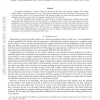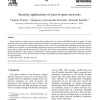5 search results - page 1 / 1 » Selfish Response to Epidemic Propagation |
CORR
2010
Springer
13 years 4 months ago
2010
Springer
An epidemic spreading in a network calls for a decision on the part of the network members: They should decide whether to protect themselves or not. Their decision depends on the ...
SECURWARE
2008
IEEE
13 years 11 months ago
2008
IEEE
Email worms and the spam associated with them are one of the main operational security issues today because they waste time, money and resources. The high incidence of email worms...
INFOCOM
2003
IEEE
13 years 10 months ago
2003
IEEE
— It has been clear since 1988 that self-propagating code can quickly spread across a network by exploiting homogeneous security vulnerabilities. However, the last few years have...
CN
2004
13 years 4 months ago
2004
Open networks are often insecure and provide an opportunity for viruses and DDOS activities to spread. To make such networks more resilient against these kind of threats, we propo...
NDSS
2006
IEEE
13 years 10 months ago
2006
IEEE
Time zones play an important and unexplored role in malware epidemics. To understand how time and location affect malware spread dynamics, we studied botnets, or large coordinated...



